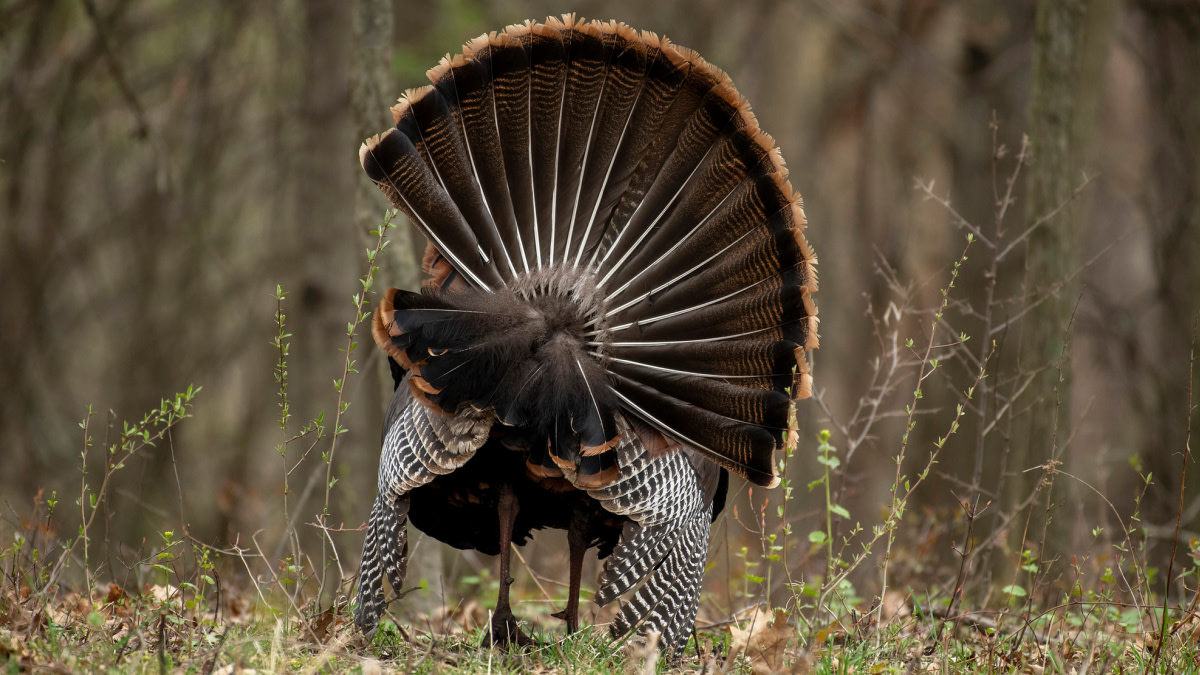
If you’re looking to squeeze as many hours as possible from a short spring season, don’t discount the fading light of evening as a prime occasion to catch alongbeard at his most vulnerable. While the enthusiasm of a new day and the warmth of morning sunlight on his feathers may make a gobbler more likely to gobble, a few loopholes in the latter part of his daily routine provide the turkey hunter with opportunities to outwit a wild tom.
Follow His Crop
Undoubtedly, gobblers chooseromance over sustenancethroughout the breeding season. Nonetheless, their high-horsepowered sex drive requires the occasional pit stop for refueling—usually in the moments after fly-down and in the hour or so before retiring to roost.
Position yourself in established feeding areas including open fields near water sources. While the tom may not roost in this area, he’s likely to spend time here recharging when the demand for his breeding services wanes. If he’s still preoccupied with the ladies, understand that they too are just as likely to frequent these same areas for an evening meal before bed anddrag him along into shotgun range.
Harass His Harem
Some of my best calling has fallen on the deaf ears of a lovestruck gobbler but resulted in a hard-earned notched tag when I got under his girlfriend’s skin. Appealing to the territorial tendencies of hens occasionally results in them pulling the longbeard away from a hunter, but sometimes the boss hen brings the entire flock in close to investigate. This strategy tends to work best when valuable resources are nearby, particularly food or established nesting areas.
Spend time in the car on your commute (alone) practicing sharp cuts and curious clucks on yourmouth diaphragmso you feel well-armed to dish back in duplicate whatever sass the boss hen throws your way. One time, a particularly ornery old hen fired off a string of 50 harsh yelps without stopping for breath when she heard me calling in her evening feeding area. She continued her vocal pursuit of the mysterious outsider hen even after therapport of my 12 gaugesent the boss tom flopping. Despite all theturkey talkechoing in the woods, the mature longbeard I killed that day never broke strut or made a peep.
Respect the Roost
While not illegal everywhere, targeting a bird that has survived another day as prey and arrived safely on the limb before the end of legal light more than crosses the ethical line shared by turkey hunters. Reaching his home branch offers a free zone and a break from two-legged predation—a gentleman’s détente at sunset interrupting an otherwise bare-knuckled brawl.
However, his evening runway and pre-flight staging areas are fair game. I make note of these spots when I’m lucky enough to witness the evening fly-up, or try to predict them from satellite imagery of known roosting sites. A henned-up or hunter-savvy old tom may shy away from calling only to succumb to a well-executed ambush strategy here.
Run and Gun for a Vocal Tom
I’ve met a few longbeards with a penchant for greediness when the hens are receptive and plentiful. As the day fades and the hens disperse and shun his advances while filling their crops for evening, two-year-old gobblers often try to squeeze in a few more romantic encounters before fly-up. If you can elicit an early evening gobble in response to your call, beat feet towards that bird. While not common, a hearty evening response gobble carries with it a strong likelihood that he will investigate your location.
Listen carefully to his voice, though, and ensure that his feet are still on the ground when he responds. Toms in heavily-pressured public areas tend to turn in early for the evening—sometimes more than an hour before sunset—but continue to advertise their roosting areas to hens for tomorrow’s rendezvous. Let me spare you the frustration ofsneaking in too closeexpecting to battle him on the ground only to bust a longbeard off his roost (and into the next drainage) that you could have killed in the morning.
When in doubt, just wait him out, even if he fails to show before roosting. Sometimes the evening success strategy involves using the lonely, impending darkness to hash out a plan for the following morning. You may not have a turkey, but you’ve dropped a reliable pin fortomorrow’s rematch.
Shop
Sign In or Create a Free Account
Related

Turkey
How to Kill a Tom Off the Roost

Turkey
How to Kill a Silent Tom




